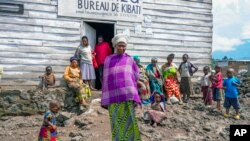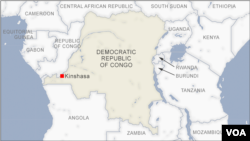The government of Uganda and the U.N. Refugee Agency say a surge of refugees fleeing conflict in the Democratic Republic of Congo is tearing apart families and stretching aid resources.
The UNHCR says officials were prepared to help some 68,000 Congolese refugees expected in Uganda, but now 150,000 are predicted to arrive by year's end.
Congolese refugees stream across Uganda's western border with the DRC to escape nearly a year of fighting between M23 rebels and DRC government troops.
Senjiwuva Gasigwa Phillipe, one of many refugees crossing into Uganda, says people were forced to flee when gunfire woke them in the middle of the night. He was separated from family members as they fled, but recently has been reunited with them.
Other refugees weren't so lucky.
Amani Gidide lost contact with three of her children, and is now moving from a transit center to a refugee settlement. With God's love, she says, her children will be found.
The UNHCR says 71,000 refugees have crossed into Uganda from the DRC since January, and that number is expected to more than double by the end of the year.
UNHCR's Uganda representative Matthew Crentsil says as a result, resources are overstretched.
"If you look at the funding received now compared to the new needs, given the planning figure which has been reviewed, it's only about 11 percent or so which has been received, which is woefully inadequate to cover the growing needs of these refugees," Crentsil said.
Ugandan officials say a holding center for refugees has been opened to support the overflowing transit center, which already hosts some 14,000 refugees.
"We are operating two centers at a go," said Daniel Kisamo, Nyakabande Refugee Transit and Holding Center refugee commandant. "The transit center being for those ones who are ready to move to the settlement. Then the holding center was designated for those ones who still need to make up their mind. Or in case to wait for their family members, because we know what war does."
The M23 rebels launched attacks on DRC forces in 2012, saying they were fighting for good governance. After being quiet for nearly a decade, the group resumed fighting in late 2021, seizing territory and causing refugees to flee the violence.
Congo has repeatedly accused its smaller central African neighbor Rwanda of backing the M23, a charge Kigali denies.
Meanwhile, Congolese refugees like Gidide wait, hoping to be reunited with family and return home soon.





